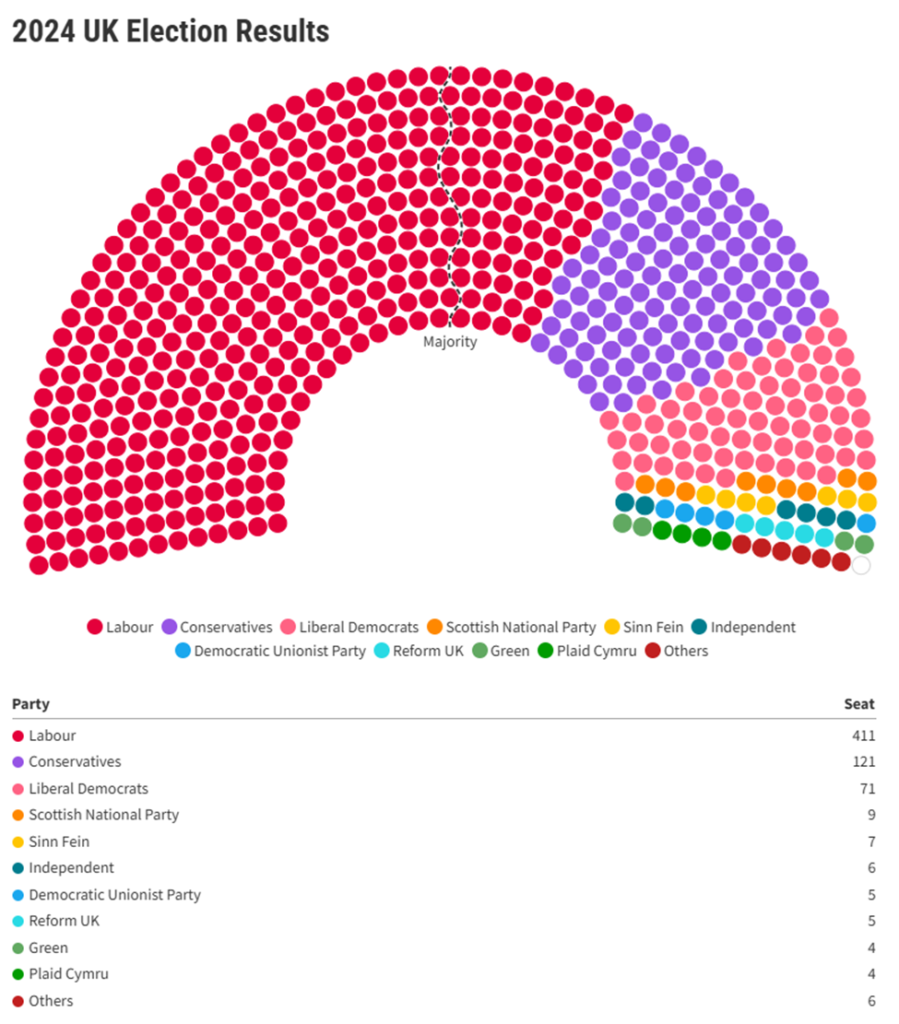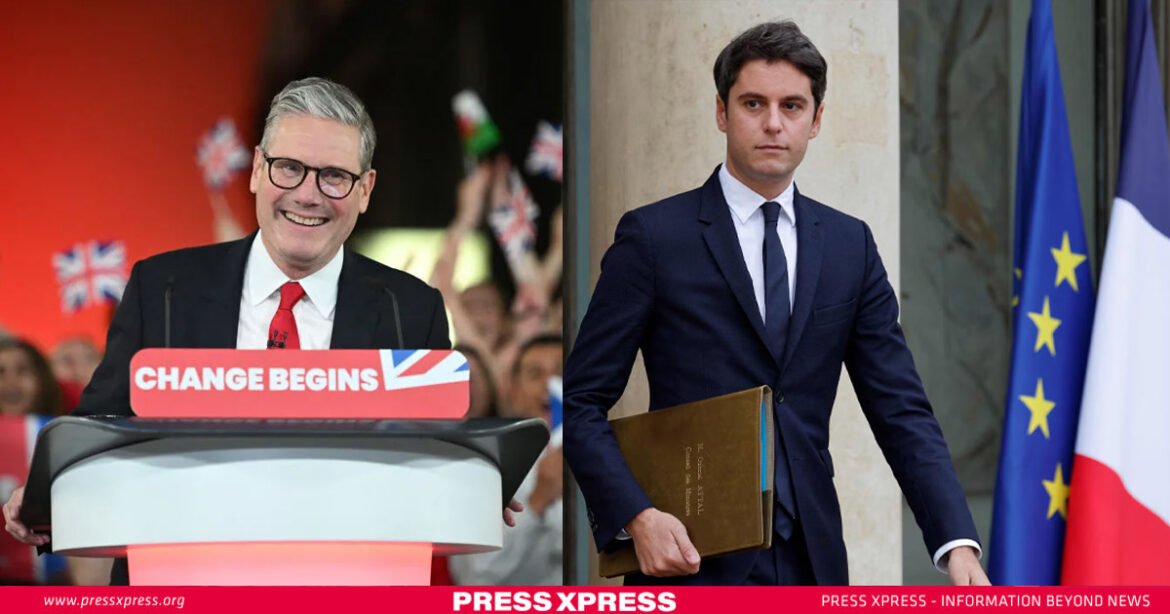The UK and France have recently undergone political changes, with new governments taking shape in both countries. In the UK, Keir Starmer now leads the Labor Party to victory, marking the first Labor win since 2005.
You can also read: UK Election: Keir Starmer’s Historic Win in landslide Victory
Across the Channel, Emmanuel Macron has appointed Gabriel Attal as France’s Prime Minister, making him the youngest person to hold this position in French history. These shifts in leadership are poised to have far-reaching effects on European politics and policies.
Challenges for the UK’s New Government

Starmer’s administration faces a host of immediate challenges as it takes the reins. Economic recovery tops the list of priorities, with the government needing to address issues such as public sector pay and infrastructure investment.

The cabinet {Figure 1} must also tackle pressing concerns like the debt crisis at Thames Water and overcrowding in prisons. Key figures in Starmer’s team include Rachel Reeves as Chancellor and David Lammy as Foreign Secretary, both of whom will play crucial roles in shaping the UK’s domestic and international policies.
France’s New Cabinet and Its Hurdles

In France, Attal’s cabinet comprises a mix of seasoned politicians and fresh faces {Figure 2}. Macron’s goal in this reshuffle is twofold: to breathe new life into his second term and to address the growing concern over rising living costs.
The new government faces the delicate task of maintaining political stability while responding to public sentiment on controversial reforms. Experienced ministers like Gérald Darmanin and Bruno Le Maire have retained their positions, providing continuity in key areas such as interior affairs and finance.
It should be noted that France’s National Assembly elections are stated to have their second round of voting on 7th July, with the right-wing National Rally (RN) projected to win; however, Macron has called on a broad democratic alliance to block the RN’s bid to form an absolute majority assembly.
For the uninitiated, this may seem confusing, therefore, here is a short explainer: In France, the roles of the President and the Prime Minister, along with their ability to form a cabinet, are separate from the National Assembly elections. The President appoints the Prime Minister, who then forms a government by appointing cabinet ministers. This can happen independently of National Assembly elections.
The President’s ability to appoint a Prime Minister and form a government is not directly tied to whether the National Assembly is dissolved or new elections are called. Even if snap elections for the National Assembly are held, the President retains the power to appoint a Prime Minister and form a new cabinet. The National Assembly, however, can influence the stability and longevity of the government since it can pass a vote of no confidence, forcing the Prime Minister to resign if the majority opposes it.
Marine Le Pen and Keir Starmer: Impact on European Policies

The political scene in Europe is changing as Marine Le Pen in France and Keir Starmer in the UK gain prominence. Le Pen’s National Rally has achieved considerable success in the first round of snap elections {Figure 3}, indicating growing support for far-right policies in France. At the same time, Starmer’s Labor Party has established a strong position in the UK, championing center-left policies.
Impact on EU Migration Policy
Le Pen’s increasing influence could result in a harder line on EU migration policies. She supports tighter border controls and aims to reduce France’s reliance on EU agreements, which might disrupt the current migration quota system.
Effects on the Ukraine Conflict
A potential Le Pen presidency raises questions about France’s support for Ukraine. She has hinted at reducing France’s involvement in NATO, which could weaken the EU’s united front against Russian aggression. Starmer backs maintaining strong ties with NATO and supports the EU’s current policy on Ukraine, ensuring continued backing for Ukrainian sovereignty.
The leadership changes in both countries are likely to influence European policies significantly. Starmer’s approach to rebuilding trust and fostering unity could reshape the UK’s relationship with the EU, particularly in areas such as migration policy. The Labor government aims to negotiate new migrant returns deal with the EU while steering clear of the contentious EU quota scheme.
In France, Macron’s strategy in appointing Attal appears to be a response to the rising tide of far-right populism. The French administration will focus on countering these influences while maintaining the country’s commitment to EU integration and NATO. This balancing act will be crucial as France navigates its role in an increasingly polarized European Parliament.
Analysis: The Far-Right Resurgence in Europe
It would seem that the long-held practice of keeping extremist groups away from governmental power in Europe has come to an end. For many years, political parties across the spectrum united to prevent far-right factions from gaining control. Now, this approach – referred to in France as a cordon sanitaire or firewall – is crumbling as populist and nationalist parties gain strength throughout the continent. Mostly due to pro-migration, virtue-driven, ultra-liberal policies of the EU.

Currently, six EU nations – Italy, Finland, Slovakia, Hungary, Croatia, and the Czech Republic – have far-right parties participating in their governments {Figure 4}. In Sweden, the government’s survival depends on a confidence and supply agreement with the nationalist Sweden Democrats, who are the second-largest force in parliament. Meanwhile, in the Netherlands, Geert Wilders, known for his anti-Islamic rhetoric, stands on the brink of power after reaching a groundbreaking agreement to form the most right-leaning government in recent Dutch history.
This shift marks a significant change in European politics, reflecting a growing acceptance of previously marginalized political ideologies. The rise of these parties suggests a changing political landscape where traditional alliances are being reshaped and new power dynamics are emerging across Europe.
Conclusion
It is clear that despite having new governments, the rise of the far right seems inevitable. Years of virtue-based and unrealistic policies have inflamed the citizens of Europe. The governments of these nations seem to have ignored the concerns of their respective voters and now face the wrath of a rebellion in voting choices.
The result has been that the far-right elements have capitalized on the anti-immigration, pro-liberal policies of the EU and gained popular support from the masses. Even Starmer’s center-left government is indicating that it will shy away from EU’s labor quotas if they go back to the negotiating table. In essence, those in power failed to ‘read the room’ and hence are paying the price as the walls close in on them.


